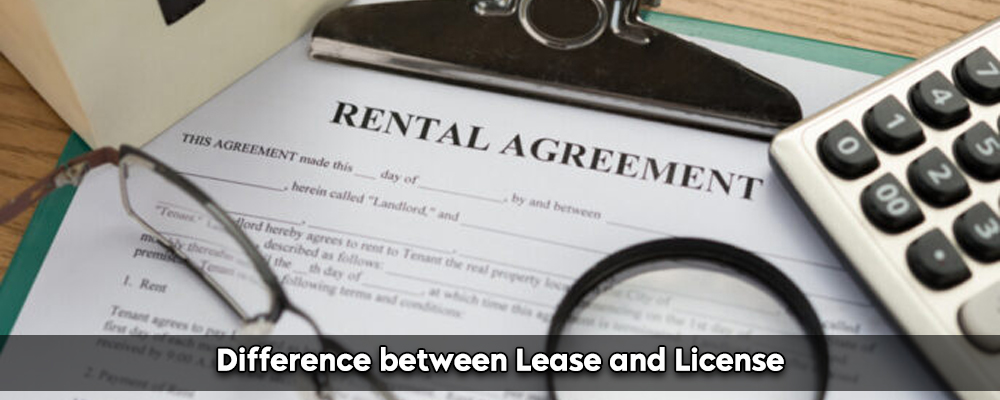The terms ‘lease’ and ‘licence’ have been defined under Section 105 of the Transfer of Property Act and Section 52 of the Indian Easements Act respectively.
Lease- Section 105 of the Transfer of Property Act
Lease deed of an immovable property could be defined as the transfer of a right to enjoy such property, for a certain period of time, express or implied, or in perpetuity, for consideration of a price paid or promised, or for money or a share of crops or any other thing of value, which has to be paid periodically or on specific occasions as decided, to the transferor by the transferee, who has accepted the transfer for such terms or conditions.
Need A Legal Advice
The internet is not a lawyer and neither are you. Talk to a real lawyer about your legal issue

Section 52 of the Easements Act, 1882
Licence can be defined as the right which a person grants to another person or a group of persons- to do or to continue to do some act, in or upon his immovable property, which shall be unlawful if committed in the absence of the guarantor. These rights would not include easementary rights or an interest in the property.
According to the Black’s Law Dictionary, in property law, the term “Licence”could be defined as an authority to do a particular act or series of acts, on a land belonging to someone else, without having possession over any estate therein. Oxford Dictionary of Law defines it as a permission to enter or occupy another individual’s land for an agreed purpose.
The essential characteristic of a lease are
- transfer of an interest;
- parties to the lease;
- subject matter of lease;
- types of lease signed;
- duration of the lease; and
- consideration for lease.
Transfer of Interest
A lease, in the case of an immovable property is a transaction with respect to immovable property and creates a right to enjoy such property for a certain term and for consideration on the conditions mentioned in it. The right to possess and enjoy a property will be transferred in the favour of the lessee which he shall acquire through the signing of the lease.
Parties to the Lease
The parties to the lease are
- the transferor also called as the lessor or landlord, and
- the transferee, also known as the lessee or the tenant.
Both parties must be competent to contract, also they cannot be the same person.
Subject Matter of Lease
The subject matter of the lease should be a specific immovable property such as land, houses, factories, shops, minerals, buildings etc.
Duration of the Lease
A lease agreement need not be for a fixed period of time, but must mention a fixed duration. Consideration in case of a Lease
There has to be a consideration decided for lease, which could be in the form of-
- Money;
- Some share in the crops which shall amount to a certain amount of money;
- Any valuable contribution that the transferee will provide on a regular basis or on certain occasions to the transferor.
Licence
A licence can be understood as a right to do or continue to do, in or upon an immovable property of the grantor of the licence, an act which shall be unlawful if done without the permission of the grantor.
Some basic difference between a Lease Agreement and a Licence issued:
- A lease would be a transfer of an interest in some specific immovable property, on the other hand a licence could be understood as a bare permission, without having to transfer any interest.
- A lease would create an interest in the favour of the lessee in relation to the property, however no interest shall be created when a licence is issued.
- A lease is both transferable and heritable, a sub tenancy could be created by the tenant and in case of the death of the tenant, tenancy could be inherited by his/her legal heir, but, licence could neither be transferred nor inherited.
- A licence will come to an end with the death of either the grantor of the licence or the one to whom the licence has been issued to, as the licence is a personal contract, however a lease will not come to an end automatically in case of the demise of either of the parties.
- A licence could be withdrawn at any time the guarantor wishes to, but a lease would end only as per the conditions of the lease deed.
- A lease would not be affected by any transfer of the property by sale made in the favour of a third party. The lease shall continue and the purchaser of the property would have to wait till the time period the lease agreement was agreed for, however in the case of a licence, in case the property has been sold to a third party, it shall come to an end with immediate effect.
- A lessee will have the right to protect the possession of the property in his own right. However, a licensee would not be able to defend his possession in his own name as there is no right in the property.
- A lessee in possession of the property shall be entitled to any improvements or accessions which have been made to the property, on the other hand a licensee will not have such right.
In order to draw a watertight lease agreement, it is advised that you seek assistance from an experienced property lawyer. Lead India offers you a team of experienced advocates who have been successfully handling cases related to property law or other civil or criminal cases as well. In case you wish to talk to a lawyer or seek free legal advice online, you may contact us.





 Talk to a Lawyer
Talk to a Lawyer